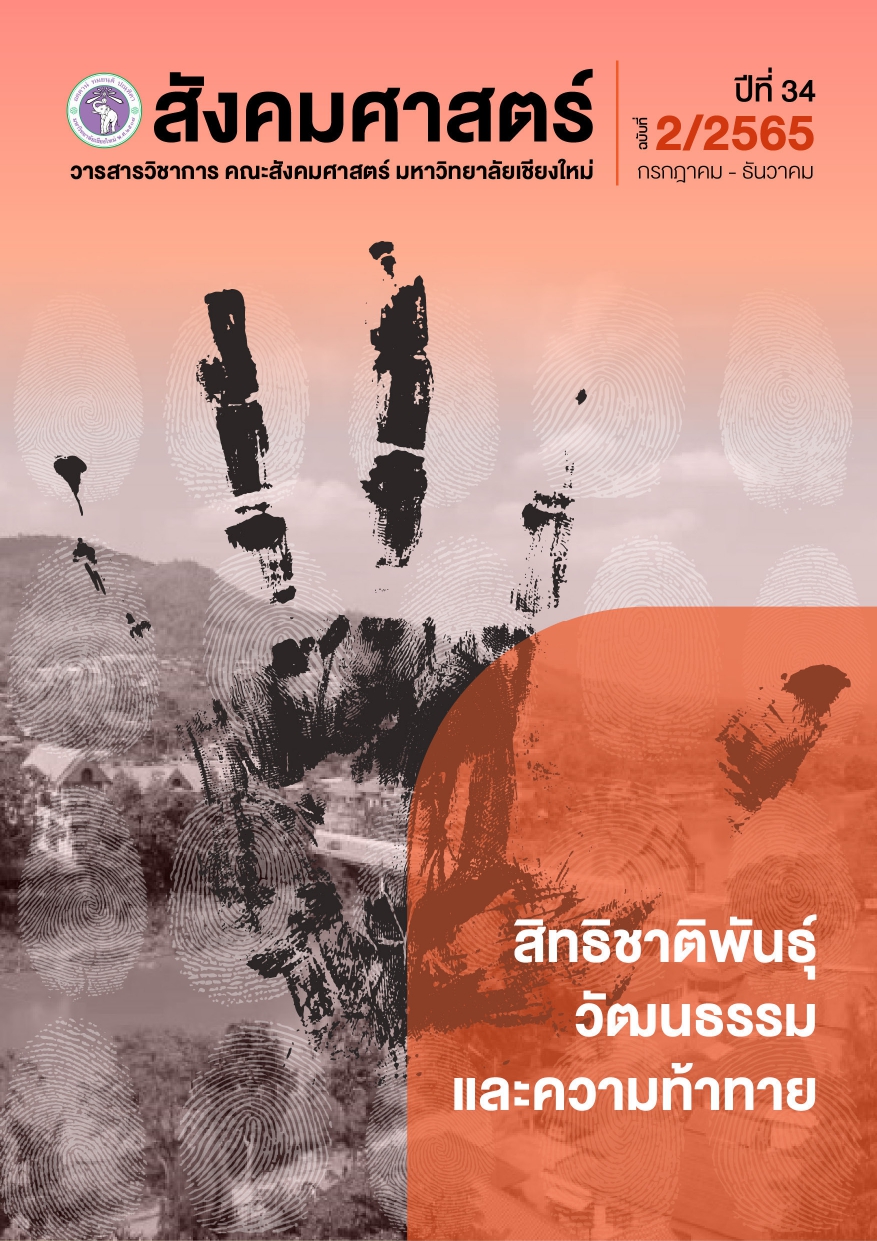วัฒนธรรมการบริโภคกับการวิ่งเพื่อสุขภาพของนักวิ่งในเมืองขอนแก่น
Main Article Content
บทคัดย่อ
บทคัดย่อ
การศึกษาวัฒนธรรมการบริโภคกับการวิ่งเพื่อสุขภาพของนักวิ่งในเมืองขอนแก่น ใช้ระเบียบวิธีวิจัยเชิงคุณภาพ (qualitative research) เก็บข้อมูลจากการสัมภาษณ์เชิงลึก (in-depth interviews) เลือกกลุ่มนักวิ่งแบบเจาะจง (purposive sampling) จำนวน 3 กลุ่ม นักวิ่งจำนวน 45 คน ในพื้นที่เมืองขอนแก่น การศึกษาพบว่า เกิดการก่อตัวของกลุ่มนักวิ่งเพื่อสุขภาพภายใต้เงื่อนไขรสนิยม การรับรู้ข้อมูลข่าวสาร การสร้างตัวตน ประสบการณ์ชีวิตที่ครอบคลุมไปถึงการเปลี่ยนแปลงวิธีคิดและปฏิบัติการของปัจเจกและกลุ่มวิ่งในการดูแลสุขภาพ ดังนี้ 1) วัฒนธรรมการถ่ายรูป คลิปวิดีโอ และโพสต์ภาพวิ่งสะท้อนอัตลักษณ์นักวิ่ง เกิดความสัมพันธ์ทางอัตลักษณ์ผ่านการบริโภคในหลายมิติ และเชื่อมร้อยกับอิทธิพลของโครงสร้างตลาดที่เกี่ยวข้องในการผลิตสินค้าและอุปกรณ์วิ่ง การตลาดได้สร้างตำแหน่งแห่งที่ให้กับผู้บริโภคบางกลุ่มแสดงตัวตน พัฒนาเป้าหมายและเปลี่ยนแปลงตัวตนผ่านการมีสถานภาพทางสังคมของผู้บริโภค 2) วัฒนธรรมจัดโปรแกรมการวิ่งเพื่อสุขภาพในชีวิตประจำวันสู่มาตราฐานสากล เกิดจากประสบการณ์ของนักวิ่งที่กลายเป็นผู้บริโภคในการวิ่งผ่านระบบความเชื่อ ทัศนคติ และปฏิบัติการที่เกิดขึ้นภายใต้โครงสร้างสถาบันทางสังคม สะท้อนผ่านความเชื่อมโยงระหว่างสถาบันทางสังคมที่มีอิทธิพลต่อความคิด ความชื่นชอบ และรสนิยมของผู้บริโภค 3) วัฒนธรรมการสร้างสถิติใหม่ของนักวิ่ง การฝึกซ้อมตามตารางในทุกวันของนักวิ่ง สร้างวัฒนธรรมการวิ่งและเกิดแบบแผนการปฏิบัติซ้ำอย่างต่อเนื่อง รวมถึงต่อรองอัตลักษณ์การมีตัวตนในฐานะนักวิ่งที่ดูแลสุขภาพ เกิดการสร้างความหมายที่ท้าทายตนเอง จนเป็นส่วนหนึ่งในวิถีชีวิตประจำวัน 4) วัฒนธรรมการบริโภคอุปกรณ์การวิ่ง อุปกรณ์การวิ่งที่นักวิ่งเลือกใช้หรือบริโภค แสดงถึงเศรษฐานะและสถานภาพทางสังคมของผู้ใช้ ด้วยอุปกรณ์เหล่านี้จะแสดงคุณค่าในเชิงสัญญะ (sign) ทั้งราคาและมูลค่าของอุปกรณ์วิ่ง อำนาจการครอบครองในการบริโภคสินค้า อุปกรณ์เหล่านี้สะท้อนความพิเศษของผู้ใช้งาน และแสดงให้เห็นถึงการขยายตัวของอุตสาหกรรมแฟชั่น 5) วัฒนธรรมการบริโภคสื่อเกี่ยวกับการวิ่ง ก่อวัฒนธรรมการบริโภคในการวิ่งเพื่อสุขภาพบนพื้นที่สื่อ ถือเป็นจุดเริ่มต้นที่นำไปสู่การสร้างความหมายของกลุ่มนักวิ่งที่นำเสนอตัวตนในทุกพื้นที่ทั้งออนไลน์และออฟไลน์ เกิดการไหลเลื่อนในวัฒนธรรมการบริโภคที่เชื่อมโยงความสัมพันธ์กับเงื่อนไขส่วนบุคคล เงื่อนไขทางความคิด เงื่อนไขทางสังคมและวัฒนธรรมที่เกิดจากการมีปฏิสัมพันธ์กับผู้อื่น และการรับอิทธิพลจากสื่อรอบด้านในกระแสโลกาภิวัตน์
คำสำคัญ: วัฒนธรรมการบริโภค, การวิ่งเพื่อสุขภาพ, นักวิ่ง
Article Details

อนุญาตภายใต้เงื่อนไข Creative Commons Attribution-NonCommercial-NoDerivatives 4.0 International License.
ข้อเขียนทั้งหมดทีปรากฏในวารสารสังคมศาสตร์ เป็นความคิดเห็นของผู้เขียนโดยเฉพาะ มิใช่ทัศนคติของคณะสังคมศาสตร์ มหาวิทยาลัยเชียงใหม่ หรือกองบรรณาธิการวารสารสังคมศาสตร์
เอกสารอ้างอิง
เอกสารอ้างอิง
คณะกรรมการพัฒนาแผนส่งเสริมกิจกรรมทางกาย. 2561. แผนส่งเสริมกิจกรรมทางกายชาติ พ.ศ.2561-2573. สำนักงานกองทุนสนับสนุนการสร้างเสริมสุขภาพ (สสส.).
สำนักงานกองทุนสนับสนุนการสร้างเสริมสุขภาพ (สสส.). 2560. สถิติผู้ออกกำลังกายด้วยการวิ่งในประเทศไทย. สืบค้นเมื่อ 30 พฤษภาคม 2564.
https://www.thaihealth.or.th/Infographic/detail/ /39560.
Allen, Douglas E. 2002. “Toward a Theory of Consumer Choice as Sociohistorically Shaped Practical Experience: The Fits-Like-a-Glove (FLAG) Framework”. Journal of Consumer Research 28 (1): 512-533.
Arnould, Eric J. 1989. “Toward A Broadened Theory of Preference Formation and the Diffusion of Innovations: Cases from Zinder Province, Niger Republic”. Journal of Consumer Research 16 (2): 239-267.
Arnould, Eric J. and Kjeldgaard, Dannie. 2005. “Postassimilationist Ethnic Consumer Research: Qualifications and Extensions”. Journal of Consumer Research 32 (1): 160-170.
Arnould, Eric J. and Price, Linda. 1993. “River Magic: Extraordinary Experience and the Extended Service Encounter”. Journal of Consumer Research 20 (1): 24-45.
Arnould, Eric J., and Thompson, Craig J. 2005. “Consumer Culture Theory (CCT): Twenty Years of Research”. Journal of Consumer Research 31 (1): 868-882.
Arnould, Eric J. and Thompson, Craig J. 2017. Consumer Culture Theory. New York: Kindle Edition.
Bauman, Zygmunt. 2007. Consuming Life. Cambridge: Polity Press.
Bauman, Zygmunt. 2006. Flydende modernitet. København: Hans Reitzels Forlag.
Featherstone, Mike. 1991. Consumer Culture and Postmodernism. London: Sage Publications.
Hirschman, Elizabeth C. 1993. The Semiotics of Consumption: Interpreting Symbolic Consumer Behavior in Popular Culture and Works of Art (Cognitive Linguistics Research). Berlin: Mouton de Gruyter.
Hirschman, Elizabeth C and Holbrook, Morris B. 1982. “Hedonic Consumption: Emerging Concepts, Methods and Propositions”. Journal of Marketing 46 (3): 92-101.
Joy, Annamma and Li, Eric P. H. 2012. “Studying Consumption Behaviour through Multiple Lenses: An Overview of Consumer Culture Theory”. Journal of Business Anthropology 1 (1): 141-173.
Kozinets, Robert V., Handelman, Jay M. and Lee, Michael, S. W. 2010. “Don't read this; or, who cares what the hell anti-consumption is, anyways?”. Consumption Markets and Culture 13 (3): 225-233.
McCracken, Grant. 2005. Culture and Consumption II: Markets, Meaning, and Brand Management. Bloomington: Indiana University Press.
Miller, M. A. (1995). Culture, spirituality. Boston: McGraw-Hill.
Muniz, Albert M. and O’Guinn, Thomas. 2000. “Brand Community”. Journal of Consumer Research 26 (4): 412-432.
Murray, Jeff B. (2002). “The Politics of Consumption: A Re-Inquiry on Thompson and Haytko’s(1997) ‘Speaking of Fashion’”. Journal of Consumer Research 29 (3): 427-440.
Otnes, Cele C., Lowrey Tina M., and Kim, Young C. 1993. “Gift Selection for Easy and Difficult Recipients: A Social Roles Interpretation”. Journal of Consumer Research 20 (2): 229-244.
Simonson, Itamar, Carmon Ziv, Dhar Ravi, and Nowlis Stephen. 2001. “Consumer Research: In Search of Identity”. Annual Review of Psychology 52: 249-275.
Thompson, Craig J. 2004. “Marketplace Mythology and Discourses of Power,” Journal of Consumer Research 31 (2): 162-180
Thompson, Craig J. and Haytko Diana L.. 1997. “Speaking of Fashion: Consumers' Uses of Fashion Discourses and the Appropriation of Countervailing Cultural Meanings”. Journal of Consumer Research 24 (2): 15-42.
Thompson, Craig J. and Tambyah, Siok K. 1999. “Trying to Be Cosmopolitan”. Journal of Consumer Research 26 (3): 214-241.
Thompson, Craig J., William B. Locander, and Howard R. Pollio. 1989. “Putting ConsumerExperience Back into Consumer Research: The Philosophy and Method of Existential-Phenomenology”. Journal of Consumer Research 16 (2): 133-146.
Thornton, Sarah. 1996. Club Cultures: Music, Media, and Subcultural Capital, Hanover. NH: Published by University Press of New England.
Wallendorf, Melanie. 2001. “Literally Literacy”. Journal of Consumer Research 27 (4): 505–511.


